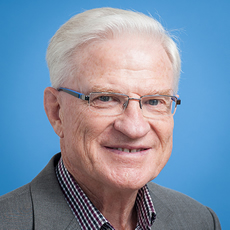Emeritus Professor retains special interest in Hong Kong
Emeritus Professor Bob Gregory takes a professional interest in the politics and government of Hong Kong, and reflects on a complex political situation as the former colony adapts to its existence as a Special Autonomous Region of China.

The School of Government has a special focus on Asia-Pacific, and a number of academics at the School have close links to the region.
One of these is Emeritus Professor Bob Gregory, who takes a professional interest in the politics and government of Hong Kong.
"I retired in 2010 but then spent 18 months as a visiting professor at the City University in Hong Kong, in the Department of Public Policy," he recalls.
"It was fascinating to see how the former British colony is adapting to life under Chinese rule, and I've been back several times since to observe the changes taking place."
Bob says it's a complex political situation as Hong Kong adapts to its existence as a Special Autonomous Region (SAR) of China.
"On the one hand, you have a strong pro-democracy movement that seeks to extend democratic rights for the citizens of the SAR.
"On the other, you have a large group that prefers accommodation with Beijing and doesn't approve of what the pro-democracy people are doing.
"Tensions boiled over last year when pro-democracy protestors occupied an area of the CBD, the so-called Occupy Central movement. Images of the protestors, and the umbrellas they used to shield themselves from teargas, were flashed around the world."
Tensions in Hong Kong coming to a head again
These tensions remain, says Bob, and "things are coming to a head again".
The anniversary of the Tiananmen Square killings on June 4 saw pro-democracy demonstrations, and the anniversary of the hand-back of the colony to China in 1997 is sure to produce further demonstrations on July 1.
"Of huge importance will be the Legislative Council's vote later this month on a bill to introduce universal suffrage in the election of the Chief Executive from 2017," he observes.
"You might think the pro-democracy people would support this bill, but enough of them have said they'll vote against it to prevent the two-thirds majority needed, because they disapprove of the restrictions placed upon the proposed electoral process by the Chinese government."
However, rejection of the bill would leave Hong Kong without any form of universal suffrage.
"A meeting in Shenzhen recently between Hong Kong legislators and Chinese government officials was called to find a way forward, but it came to nothing. If anything, it hardened the intention of the pro-democracy legislators to vote against Beijing’s universal suffrage proposal."
The future of democracy in Hong Kong
Bob has some thoughts on the future of democracy in Hong Kong.
"The Basic Law, agreed to by China and the British before the hand-back, is Hong Kong's mini-constitution, which guarantees substantial autonomy and things like the rule of law and freedom of the press till 2047.
"Hong Kong has preserved a degree of liberty: the press is more or less free to say what it likes, and the Chinese Communist Party and the People's Liberation Army keep a low profile.
"But pressure to conform to Beijing’s wishes is certainly present, and self-censorship of various kinds does occur, probably increasingly so.
"Ultimately, a lot will depend on what happens in China itself – and there are different views on how things might unfold there."
